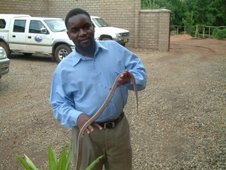2010 International Year of Biodiversity
by Hastings Maloya
Happy New year. Yes, we are in a new decade. And the year 2010, which looks a very busy one especially sports wise, is International Year of Biodiversity according to a declaration by the United Nations Convention on Biological Diversity. For the next twelve months Malawi joins the international community in celebrating biological diversity and boosting awareness of how important it is for our lives.
Biological diversity, or “biodiversity,” refers to the variety and variability among living organisms be it flora and vegetation, mammals, birds, reptiles and amphibians, fish and a variety of other living things. This also includes diversity of ecosystems, species and genes, and the ecological processes that support them.
David Nangoma, programme officer responsible for biodiversity conservation, research and monitoring for the Mulanje Mountain Conservation Trust (MMCT) says dedication of the year 2010 to celebrate biodiversity is the best way to start the decade.
"The importance of biodiversity as flora and fauna can not be over-emphasized. From a local perspective, it provides the basic livelihoods for the majority of communities as there is provision of virtually everything that nature can provide to mankind", says Nangoma.
Malawi has significant biodiversity as it sits at the crossroads of the East and Central African and Southern African floral and fauna sub regions. it also has a very high human population, the majority living in rural areas and dependant on these biodiversity resources for their survival.
Natural diversity in ecosystems provides essential economic benefits and services to human society - such as food, clothing, shelter, fuel and medicines - as well as ecological, recreational, cultural and aesthetic values, and thus plays an important role in sustainable development.
However, most people, not only in Malawi, but the world over appreciate the beauty of the natural world, but awareness of biodiversity, how seriously it is threatened, and the implications for human well being, is alarmingly low.
This leads to our ecological sites facing threats that include unsustainable resource harvesting, over-harvesting and use, encroachment into the protected areas - sometimes due to population growth, annual damaging forest fires and introduction and/or invasion of alien plant species. Biodiversity is therefore under threat in many areas of the world.
Nangoma says major threats to biodiversity in Malawi and most African countries includes uncontrollable annual forest fires.
"Forest fires have been the main cause of damage to ecosystems that most living things habit. Other threats are encroachment into protected areas by way of establishing settlements and agricultural expansion, which in most cases is due to population growth," observes Nangoma adding that the introduction of some alien invasive plant species has also been of great concern.
Concern about global biodiversity loss has emerged as a prominent and widespread public issue.
According to the United Nations, we need “to see biodiversity at the top of the global agenda, leading to stronger action from all sectors of society including government and industry to safeguard it. To do this we have to show how biodiversity is essential for sustaining our natural living systems—or ecosystem—that provide us with clean air and water, food, building materials, fuel and medicine”.
Throughout the year countless initiatives need to be organized to disseminate information, promote the protection of biodiversity and encourage organizations, institutions, companies and individuals to take direct action to reduce the constant loss of biological diversity worldwide.
Among several others, objectives of the International Year of Biodiversity are to raise awareness of the importance of conserving biodiversity for human well-being and promote understanding of the economic value of biodiversity and to enhance public knowledge of the threats to biodiversity and means to conserve it.
Awareness efforts need to put emphasis on the importance of biodiversity through our values, performance, and communication and engagement. We need to strive to conduct our operations to make sure that everyone understands that humans and the natural environment are interdependent and interact with each other in various ways. In managing our impacts we consider those interrelationships and the functions ecosystems perform in supporting sustainable economic development and seek ways to make positive contributions to biodiversity conservation in areas that we live.
Humans are an integral part of biodiversity and have the power to protect or destroy it. Currently, our activities as humans are destroying the natural world at an unprecedented rate through climate change, habitat destruction, over- harvesting, pollution and many other activities. We’re facing a global species extinction crisis. But there is growing recognition that biological diversity is the lifeblood of sustainable development and human welfare.
Well managed natural resources support peaceful communities, encourage well-balanced economic growth and help reduce poverty. It is therefore our responsibility to join hands as we commemorate the INTERNATIONAL YEAR OF BIODIVERSITY
I WELCOME you!
Dear Good People,
I warmly welcome you to my Blog and it is my profound hope that you will find it useful and worth the time you spend on it. On this Blog, I have posted some of the articles and pieces that I have writen just for record purposes and also for sharing. You might have read these articles in the papers but it could also be possible that you missed them.
Please be advised that these are my toughts and purely my opinions. You are free to comment on them and/or to critic them. I will appreciate any of your comments.
Thank You.
Hastings Maloya
+265 888864241 or +265 999950953
I warmly welcome you to my Blog and it is my profound hope that you will find it useful and worth the time you spend on it. On this Blog, I have posted some of the articles and pieces that I have writen just for record purposes and also for sharing. You might have read these articles in the papers but it could also be possible that you missed them.
Please be advised that these are my toughts and purely my opinions. You are free to comment on them and/or to critic them. I will appreciate any of your comments.
Thank You.
Hastings Maloya
+265 888864241 or +265 999950953
About Me
- Hastings A. MALOYA
- Mulanje, Southern Region, Malawi
- Is an experienced journalist, writer, specialist in development communications, public relations, publications, desktop publishing, information technology, photography, environmental education and rural development. Hastings Maloya is currently working as Programme Officer responsible for Environmental Education, Awareness and Communications for the Mulanje Mountain Conservation Trust (MMCT) since September 1, 2002. Hastings, comes from Tradional Authority Mabuka in Mulanje District, is an Adventist Christian, and has two daughters Eva and Eve.
Subscribe to:
Post Comments (Atom)








No comments:
Post a Comment